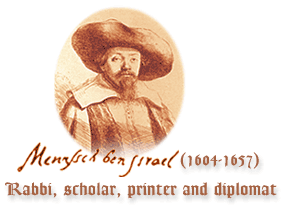|

| Born
in Madeira, Portugal, as a Marrano (a new Christian living secretly as a
Jew), Manoel Dias Soeiro escaped the Inquisition, settling in Amsterdam
with his family. Here he was reinitiated into the Jewish covenant and renamed
Menasseh ben Israel. Rabbi, scholar, printer and diplomat, Menasseh ben
Israel (1604-1657) of Amsterdam was one of the most influential personalities
in modern Jewish history. |
A native of Lisbon, Gaspar
Rodrigues Nunez had once been a prosperous, if back-sliding, New Christian.
Having fallen under the suspicion of the Inquisition in the early 17th century,
he joined the swelling numbers of Jewish refugees from Portugal and Spain; sometime
around 1610 he escaped Portugal with his wife and three children, settling in
Amsterdam, a haven for Jewish and non-Christian exiles. He took the name
Joseph b. Israel and called his two sons Ephraim and Menasseh respectively.
The son who had been born
to him in 1604 Madiera on his journey of flight from the Inquisition and had
been baptized Manoel Dias, was now initiated into the Jewish covenant and renamed
Menasseh ben Israel. Menasseh demonstrated prodigious talent in his studies.
He began to frequent the yeshivot at age 14, and made his first public
oration in Portuguese when he was 15. His linguistic ability was phenomenal,
and he mastered many languages well, allowing him to read a vast variety of
works. At the age of 17 Menasseh wrote his first book, Safah Berurah,
a grammatical work (unpublished). By the age of 18 Menasseh ben Israel was already
recognized as a gifted preacher, succeeding R. Isaac Uzziel in the Neveh Shalom
Synagogue in 1622.
It was not long before he
had earned a reputation as one of Europe's leading Hebrew
scholars. With the idea of getting his writings into print and supplementing
his meager income, he started a small printing press in 1626, at the age of
22. This was the earliest Hebrew printing
press in Amsterdam, and here he produced more than 70 books in Hebrew, Spanish
and Portuguese.
Ben Israel's first learned
production, a Hebrew grammar, was the first of many scholarly
works, among them the Conciliador which sought to reconcile apparently
contradictory passages of Scripture. A true man of letters, Ben Israel was highly
regarded by the scholarly Gentile world for his theological works and linguistic
interpretations of the Bible. The two greatest of his contemporary countrymen,
Hugo Grotius (Dutch jurist and humanist) and Rembrandt, were among his admirers
(Rembrandt produced a portrait of Ben Israel as well as four etchings for the
latter's mystical work, La Piedra Gloriosa).
Although Ben Israel served
the Amsterdam community in various capacities — preacher,
teacher, merchant, printer and publisher, he was never its official rabbi, and
despite his publishing activities, he never seem to have sufficient income.
In his later years, Ben Israel also served as diplomat
and political leader. He is known for his petition to Oliver Cromwell, Lord
Protector of England, and the British Parliament, to readmit the Jews of England
(they had been expelled in 1290). Menasseh died at Middelburg, Holland in the
autumn of 1657, shortly after his return from England.
[For
more about Menasseh ben Israel, use the
pull-down menu at the top of this page.]
|



